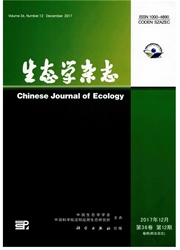

 中文摘要:
中文摘要:
解析植物木质部导水率对逆境的响应和适应对促进植物抗逆性机理研究和受损植被恢复具有重要意义。该文以荒漠河岸林建群种胡杨(Populus euphratica)为研究对象,系统分析了胡杨幼株根、茎、叶水分传输通道对不同浓度盐胁迫的响应和适应。结果表明:(1)胡杨幼株根系对盐胁迫的敏感性高于茎和叶,盐胁迫下根系生长和根尖数显著受到抑制,根木质部易于发生栓塞,导水率明显降低。(2)胡杨幼株茎木质部导水率对盐胁迫的响应依盐浓度而定,轻度(0.05 mol·L^–1 Na Cl)和中度(0.15 mol·L^–1 Na Cl)盐胁迫下,胡杨可以通过协调导管输水的有效性和安全性来调节木质部的导水率,维持植物正常生长;重度(0.30 mol·L^–1 Na Cl)盐胁迫下,胡杨茎木质部导管输水有效性和安全性均明显降低,木质部导水率显著下降,并伴随叶片气孔导度的显著降低,从而严重抑制了胡杨的光合和生长。
 英文摘要:
英文摘要:
Aims Soil salinity is a major limiting factor for plant establishment,development and productivity in arid environment. This study was conducted to determine the responses and adaptation of xylem hydraulic conductivity to salt stress in Populus euphratica in order to understand the mechanisms of stress resistance and restoration strategy of this species.Methods The responses and adaptation of hydraulic conductivity to different levels of salt stress(Na Cl concentrations of 0,0.05,0.15 and 0.30 mol·L^–1) were investigated in P. euphratica seedlings. The testing plants were subjected to salt stresses for three months,and the stomatal conductance of leaves,hydraulic conductivity and vulnerability to cavitation of roots and stem xylem,anatomical structure of xylem vessels and root morphology and distribution were measured. The resulting data were analyzed to determine the relationships of salt stress with root uptake,hydraulic conductivity of xylem and foliar transpiration by using ANOVA,LSD and Pearson correlations. Important findings The roots of P. euphratica seedlings were more responsive to salt stress than stem and leaves. Root length and root tips were significantly inhibited by the salt stresses imposed. Under the salt stress,root hydraulic conductivity was significantly reduced and root xylem was more vulnerable to cavitation. The responses of stem xylem conductivity to salt stresses varied with the level of salt stress. Under a mild(0.05 mol·L^–1 Na Cl) and moderate(0.15 mol·L^–1 NaC l) salt stress,Populus euphratica seedlings adjusted hydraulic conductivity in stem xylem by increasing the wall thickness of conduit and between conduits as well the wall mechanical strength to maintain norm growth. Under a severe salt stress(0.30 mol·L^–1 Na Cl),hydraulic conductivity and safety and efficacy of water transportation of stem xylem in P. euphratica seedlings significantly decreased accompanied by reduced stomatal conductance of leaves,which eventually inhibited the plant growth.
 同期刊论文项目
同期刊论文项目
 同项目期刊论文
同项目期刊论文
 Species Composition and Species Richness in the Hetao Irrigation Region Drainage 1 Ditches, Northern
Species Composition and Species Richness in the Hetao Irrigation Region Drainage 1 Ditches, Northern 期刊信息
期刊信息
